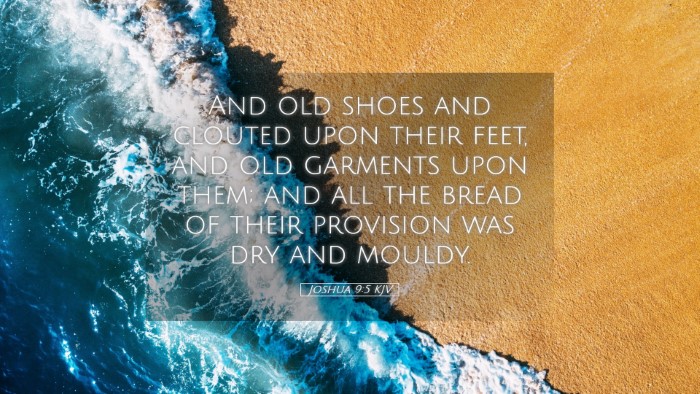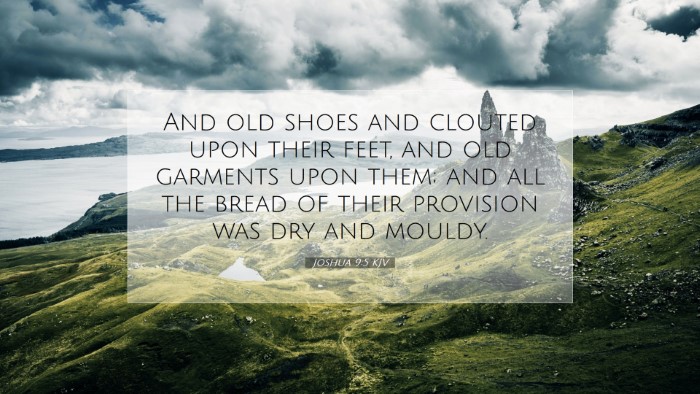Commentary on Joshua 9:5
Bible Verse (Joshua 9:5): "And they put old sacks upon their donkeys, and wineskins, old and torn, and bound up;"
Introduction
The passage from Joshua 9:5 provides a historical account of the Gibeonites' deception of the Israelites. This event unfolds in the larger narrative of the Israelites' conquest of Canaan and serves as an example of the challenges faced by God’s people in discerning truth. Analyzing this verse through the insights of well-regarded public domain commentaries helps illuminate its theological implications and moral lessons.
The Background Context
In the immediate context of Joshua 9, we find the Israelites fresh off their victories in Jericho and Ai. The conquests instilled fear across the land of Canaan. The Gibeonites, recognizing their impending doom, devised a cunning plan to save themselves from destruction.
Commentary Insights
Matthew Henry's Commentary
Matthew Henry emphasizes the tactical ingenuity displayed by the Gibeonites. By presenting themselves as weary travelers from a distant land, they sought to appeal to the Israelites' sense of hospitality and their covenantal obligations. Henry notes that the "old sacks" and "wineskins" symbolize both the apparent humility and the calculated artifice behind their approach. He argues that this passage underscores the theme of deception, illustrating how appearances can mislead even the most vigilant.
Albert Barnes' Notes on the Bible
Albert Barnes highlights the preparation of the Gibeonites as a reflection of their desperate situation. He points out the significance of their choice of materials – old sacks and worn wineskins, indicating their dire straits and the lengths they would go to preserve their lives. This, Barnes argues, serves as a metaphor for spiritual condition; believers are cautioned against allowing outward appearances to shape their judgment. He additionally remarks on the Israelites' initial naivety in this encounter, stressing the importance of seeking divine guidance in decision-making.
Adam Clarke's Commentary
Adam Clarke further explores the cultural implications of hospitality and deception regarding the Gibeonites' actions. He analyses the socio-political context, suggesting that the Gibeonites were aware that the Israelites followed a divine mandate to conquer the inhabitants of Canaan. In presenting themselves in a deceptive manner, they reveal a form of survival instinct rooted in fear. Clarke underscores the need for discernment in matters of faith and everyday life, prompting readers to confront their biases and assumptions.
Theological Themes
- Deception and Disguise: The Gibeonites’ use of physical artifacts to create an illusion prompts a deeper reflection on the nature of truth and trust in relationships.
- Discernment: The failure of the Israelites to discern the truth emphasizes the necessity of spiritual wisdom and reliance on God's guidance.
- God’s Sovereignty: Despite the deception, God’s overarching plan for His people remains intact, challenging believers to see His faithfulness amid obfuscation.
- Covenant and Responsibility: The narrative highlights the tension between human obligations and divine commands, reminding us of the seriousness of covenantal relationships.
Lessons for Today’s Believers
This verse and its surrounding context offer timeless lessons for pastors, students, theologians, and Bible scholars:
- Believers are called to investigate claims, rather than accept them at face value.
- There must be an emphasis on seeking the Lord in prayer and decision-making.
- Spiritual maturity entails an understanding of both one's own biases and the need for divine illumination.
- The Christian community must cultivate a culture of honesty and transparency, reflecting the character of Christ.
Conclusion
In conclusion, Joshua 9:5 serves as a rich text for exploring themes of deception, discernment, and covenant relationship. By examining the historical and theological dimensions of this passage through the lens of public domain commentaries, we glean insights that are vital for our spiritual journeys today. As we reflect on this narrative, may we strive to be discerning followers of Christ, ever aware of the subtleties of truth in a complex world.


